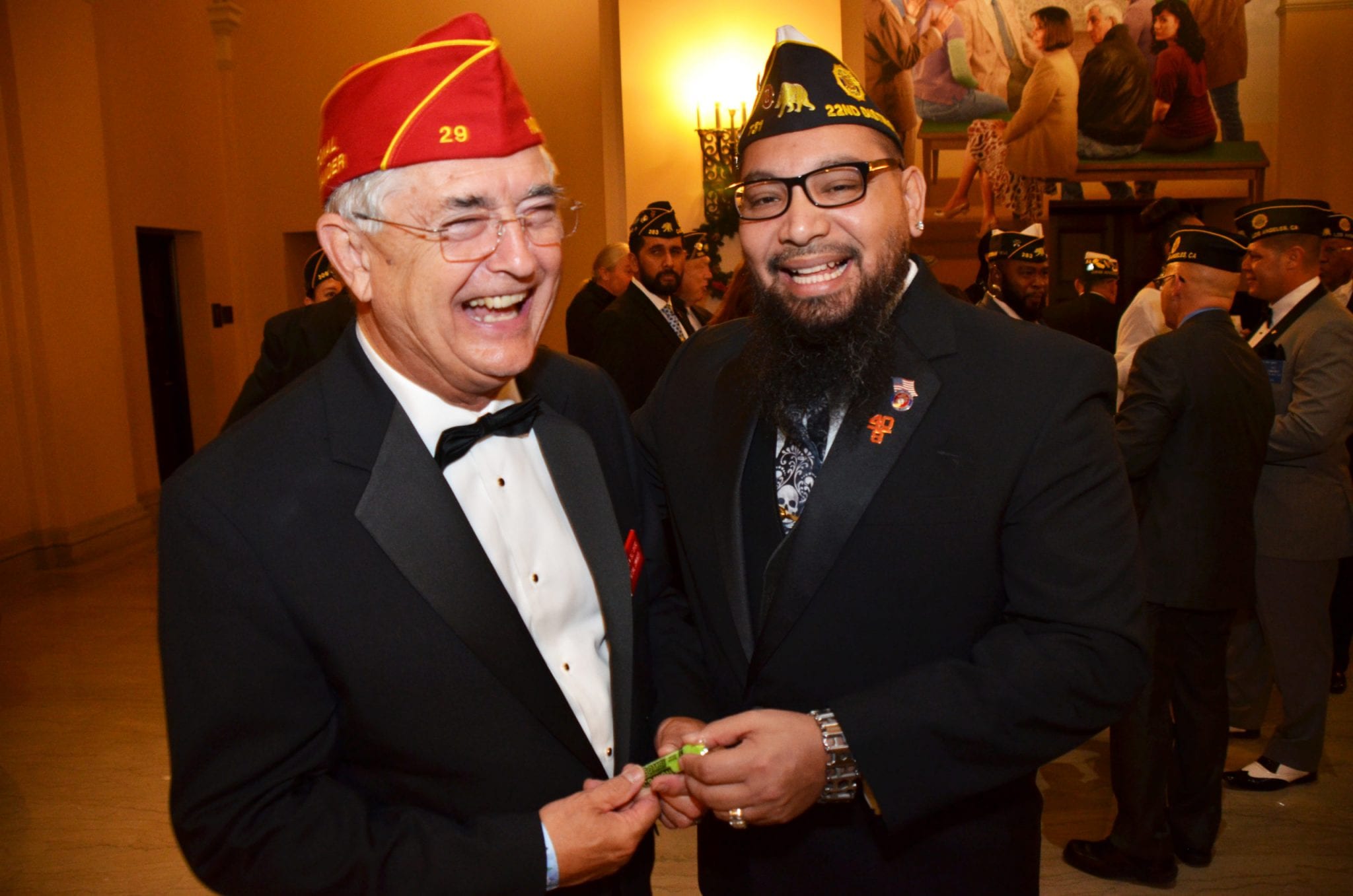
Sam Flores (right) hands a crayon to fellow Marine veteran and American Legion National Commander James W. “Bill” Oxford during his visit to Los Angeles on Saturday, Dec. 14, 2019. (Photo: Henry Sanchez)
It hasn’t been two full years since Sam Flores began helping veterans claim their earned benefits and this Post-9/11 Marine Corps veteran has already proven himself a capable steward of The American Legion’s massive veteran service officer program in California.
With the recent vacancy of its lead service officer seat, Flores was chosen to fill the gap as interim department service officer until a permanent candidate could be selected during the next Department of California convention in June. Notices have been disseminated by Department headquarters and candidates will be whittled down to one applicant appointed by the incoming commander.
“Department is looking for the right leader for a more permanent position,” Flores said. “I am putting my name in the hat.”
Though his 2nd anniversary as a service officer hits in May, Flores has already been a full-time regional manager for some two months, handling all his region’s business from his office in San Diego, which boasts California’s second highest veteran population behind Los Angeles, according to 2017 data compiled by the California Legislative Analyst’s Office. The Golden State is home to an estimated 22 million veterans, the largest population in the nation.
“California is the only state with more than one regional office,” Flores said. “And we have three.”
With a budget of $800,000 last year, there’s no doubt in Flores’ mind the department service officer job is monumental, but he’s up to the challenge. Flores prides himself in the relationships he’s able to forge through his approach to the job, which stems from his own military service.
In 2012, Flores was medically separated from the Marine Corps after a series of injuries left him unable to advance and he was subsequently forced out.
“I was a little bit salty about it but I made other plans,” Flores said.
His first serious injury came in 2003 when his convoy was struck by an improvised explosive device (IED) in al Assad, Iraq. He was in an eight-vehicle convoy transporting new troops from the airstrip, who had just arrived to replace his unit.
“There were some holes in the perimeter they were rebuilding so we had to go outside of the wire and come back in,” Flores said. “There were IEDs that weren’t swept for and our convoy got hit.”
As a result of the blast, Flores received a concussion, several traumatic brain injuries, a fractured left tibia, several broken ribs and some shrapnel in various places on the right side of his body. He was supposed to be going home, but instead had to wait in medical until he healed enough for travel.
In 2010, Flores’ contract was up and he considered getting out to become a San Diego Police officer. He was asked by his unit to extend his enlistment for one more deployment.
“I agreed,” Flores said. “Hindsight being 20-20, I shouldn’t have.”
This time, Flores was deployed to Afghanistan. While out on patrol with explosive ordnance disposal Marines sweeping in front of them, Flores’ vehicle drove over an IED.
“Our vehicle got hit and just came out from under us,” Flores said. “I fractured my hip, broke my other tibia, injured my leg. That’s why I don’t wear shorts. During the course of my career, I think I’ve had four concussions.”
If the U.S. troop surge of 2007 saw the military inhaling new recruits to meet strategic demands overseas, then 2012 was the year it let out a wide-sweeping breath, leaving thousands of transitioning troops flapping in the wind.
“So, they were giving early retirements, forcing people out,” Flores said. “If you weren’t making promotion, they were booting you.”
Getting out of the Marine Corps and leaving behind roadside bombs and potential physical trauma was easy. Transitioning into civilian life was harder, Flores said.
“I was lost just like everybody else. I didn’t know anything about the VA process,” Flores said.
Like many young Marines, Flores went to his mandatory transition assistance program classes. Also like many other young Marines, the prospect of post-military freedom and the complexity of the material didn’t exactly garner much of his attention.
“And that’s my fault,” Flores said.
Regardless, he hit the ground running, starting school right away. He was taking classes at a private architecture school during his terminal leave.
“I went a little over two years before I received my actual final decision for my initial claim,” Flores said. “It wasn’t until I walked into a Legion post that I started seeing the whole picture.”
It was at the post where he learned about all the benefits he was entitled to. Flores also credits his leaders, his mentors for where he is today and is always looking for the opportunity to pay it forward.
“I made a promise to myself, I know how much I struggled,” Flores said. “I don’t want anyone going through the same struggles I went through because I’m holding onto information that can benefit them.”
Service officer work gets challenging at times because for many veterans their veterans benefits are all the income they have, Flores said.
“Some people come in hot because they think that we are VA employees, but little do they know we’re not,” Flores said.
Veterans Administration is required by Congress to make space available for veteran service organizations in their facilities.
“So, we work in the VA, not for the VA and once they understand that they calm down,” Flores said. “At the end of the day, we’re here for the veteran and to assist them and their families for the benefits they deserve, that they fought for.”
Flores cautioned veterans against seeking paid legal advice before getting the information from a veteran service officer.
“If you are willing to pay a lawyer to do the same services that we provide for free, you’re doing yourself a disservice,” Flores said. “It happens all the time, people come in all the time saying they’re paying the lawyer more than what they’re getting in benefits. It breaks my heart everytime I hear that, but we can’t do anything about it, it’s too late if they’ve already signed a contract.”
Flores said that, yes, he is employed by The American Legion, but at the end of the day all VSOs are “one-team-one-fight.”
“I don’t care where you go to get the assistance you need,” Flores said. “If you don’t choose us, you can always reach out for a second opinion or guidance. My door is always open.”













